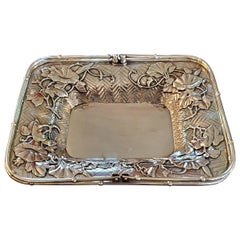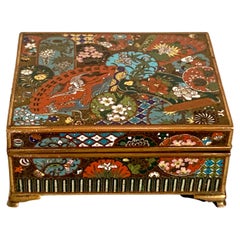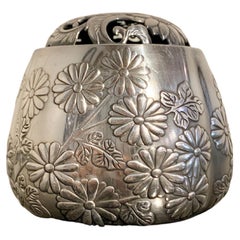Miyamoto Shoko Metalwork
1
to
1
1
1
1
1
1
1
1
1
1
1
1
3
20
18
18
7
Creator: Miyamoto Shoko
Japanese Meiji Period Sterling Silver 2 Handled Basket by Katsu Miyamoto
By Miyamoto Shoko 1
Located in Dallas, TX
PRESENTING a GORGEOUS, VERY HIGH QUALITY and EXTREMELY RARE piece of Japanese Meiji Period Sterling Silver 2 Handled Basket by Katsu Miyamoto.
EXQUISITE, EXCEPTIONAL, RARE & IMPORTANT!
This is definitely a Meiji Period piece due to the fact that it is marked with the sterling silver mark “jungin”.
The Meiji period was from 1868 to 1912 and in 1928 a law was introduced in Japan compelling the use of decimal marks for silver.
This pre-dates that decimalization law.
We are of the opinion that it is from circa 1900.
Miyamoto Shoko was founded in 1880 as the first silverware specialty shop. In 1899, Miyamoto Shoko’s silverwares were ordered by the family members of the Emperor of Japan, and to this day, they are making fine and graceful handicrafts with skillful craftsmen.
Loved by numerous customers since the Meiji era, Miyamoto Shoko’s products have also been given to Princess Mako and Princess Kako of Akishino, as well as Princess Aiko Toshinomiya, on their birthdays.
Katsu Miyamoto (宮本勝), in 1880, in order to increase the sales of tobacco and cigarettes to foreigners founded the Moyamoto Shoko company, which produced different silverwares in general and particularly silver cigarette cases. Miyamoto’s first name, Katsu (勝) in some sources is written as “Masaru”, since 勝 kanji can be pronounced in both ways.
This basket is of the HIGHEST QUALITY imaginable!
The top of the basket has the MOST GORGEOUS repousse work of flowers, probably lotus flowers, with leaves and foliage. It has an underlying chevron effect chasing, reflecting parquetry.
The 2 handles are cast in the form of bamboo handles.
The rim of the top likewise is cast as bamboo.
The base is equally stunning in a different way!
It is chased with a chevron effect, like parquetry flooring and the four feet simulate pieces of sliced bamboo with an interlinking gallery of support columns, likewise, simulating bamboo.
The QUALITY of WORKMANSHIP is OUTSTANDING!
The pieces weighs exactly 525 grams.
This piece takes my breath away!
This is one for the SERIOUS COLLECTOR of EXQUISITE AND RARE Japanese silver. You will not find another like it, for sale ANYWHERE ELSE IN THE WORLD …… I know as I have searched!
Provenance: Acquired from a Dallas Private Collector.
Dimensions: 9.6 inches wide, 7.6 inches deep and 2.75 inches tall ( 7.25 inches tall with handles up)
Condition: Very good. It looks like the base 4 legged gallery, has been repaired/re-attached to the base, but otherwise it is excellent and of Museum quality.
The Meiji period (明治時代 Meiji-jidai?), also known as the Meiji era, is a Japanese era which extended from October 23, 1868 through July 30, 1912.[1] This period represents the first half of the Empire of Japan during which Japanese society moved from being an isolated feudal society to its modern form. Fundamental changes affected its social structure, internal politics, economy, military, and foreign relations. The period corresponded with the reign of Emperor Meiji after 1868, and lasted until his death in 1912. It was succeeded by the Taishō period upon the accession of Emperor Taishō to the throne.
Solid silver pieces...
Category
Early 20th Century Japanese Meiji Miyamoto Shoko Metalwork
Materials
Sterling Silver
Related Items
Japanese Cloisonne Box, Meiji Period, Late 19th Century, Japan
Located in Austin, TX
A very fine and intricately decorated Japanese cloisonné box and cover, Meiji period, late 19th century, Japan.
The lidded trinket or jewelry...
Category
1890s Japanese Meiji Antique Miyamoto Shoko Metalwork
Materials
Brass, Copper, Enamel
Japanese Silver Incense Burner, Akoda Koro, by Norurma, Meiji Period, Japan
Located in Austin, TX
A lovely and luxurious Japanese silver incense burner of lobed melon form, akoda koro, marked jungin and signed Nomura, Meiji Period, circa 1900, Japan.
The silver koro...
Category
1910s Japanese Meiji Vintage Miyamoto Shoko Metalwork
Materials
Silver, Sterling Silver
Japanese Meiji Period Cloisonne Bowl
Located in Hamilton, Ontario
Japanese Meiji period cloisonne bowl.
Category
19th Century Japanese Meiji Antique Miyamoto Shoko Metalwork
Japanese Silver Enamel Incese Burner (Koro) Meiji Period
By Sanju Saku
Located in Gainesville, FL
Japanese silver and enamel Incense Burner (Koro) Meiji era (1868-1912), late 19th century. The koro is set on tripod feet, The body decorated with three panels of birds and flowers w...
Category
1890s Japanese Antique Miyamoto Shoko Metalwork
Materials
Silver
Japanese Head Bucket (Kubi-Oke), Lacquer, Meiji Period
Located in Point Richmond, CA
Japanese Head Bucket (Kubi-Oke), Lacquer, Meiji period.
The head bucket was used for storing and transporting severed heads. During the Samurai era clashes and battles ensued, cutt...
Category
Early 20th Century Japanese Meiji Miyamoto Shoko Metalwork
Materials
Wood, Lacquer
Japanese Silver Repousse Iris Vase Meiji Period
By Samurai Shokai
Located in Gainesville, FL
Japanese silver repousse vase finely decorated with blown out iris flowers. It is of the Meiji period, circa 1890s. The vase is 5 1/4" tall and weighs 4....
Category
19th Century Japanese Antique Miyamoto Shoko Metalwork
Materials
Silver
Japanese Cloisonne Box by Inaba, Meiji Period, circa 1900, Japan
By Inaba Cloisonne Co.
Located in Austin, TX
A fine Japanese cloisonne hinged box with pheasant and autumn foliage, by Inaba Nanaho and the Inaba Cloisonne Company, Meiji period, circa 1900, Japan.
The lovely jewelry or trin...
Category
Early 1900s Japanese Meiji Antique Miyamoto Shoko Metalwork
Materials
Copper, Enamel, Metal
Japanese Meiji Period Cloisonne Enamel Sake Pot
Located in Newark, England
Fine Japanese Meiji period cloisonne enamel Sake pot. The Sake pot of rounded form with with clean edges profusely decorated with blossoming flowers throughout upon a black ground ba...
Category
Late 19th Century Japanese Meiji Antique Miyamoto Shoko Metalwork
Materials
Metal, Enamel
Large Japanese Meiji Period Open Bronze Censor
Located in Hudson, NY
This cast bronze censor is from Japan and was made circa 1880. Raised up on three legs which issue from demons mouths the container is cast with reliefs ...
Category
Late 19th Century Japanese Meiji Antique Miyamoto Shoko Metalwork
Materials
Bronze
Japanese Meiji Period Silver Box Signed Masayuki
Located in Newark, England
Japanese Meiji period silver box with shibuichi plaque dating circa 1900. The box of rectangular form with a silver polished case stamped Jungin (J...
Category
Early 1900s Meiji Antique Miyamoto Shoko Metalwork
Materials
Silver
Japanese Meiji Twin Handled Bronze Vase with Silver, Brass & Copper Inlay
Located in Bishop's Stortford, Hertfordshire
A fine antique Japanese Meiji twin handled bronze vase decorated with floral designs in silver, brass and copper inlay dating from the 19th century...
Category
19th Century Japanese Meiji Antique Miyamoto Shoko Metalwork
Materials
Brass, Bronze, Copper, Silver
Free Shipping
H 6.89 in Dm 3.55 in
Japanese Silver Bowl
Located in London, GB
A Meiji period Japanese silver bowl with extremely detailed iris decoration and of typical double-skin form. The bowl dates form circa 1895 and was made by Katsuzo Mune, and their ma...
Category
Late 19th Century Japanese Antique Miyamoto Shoko Metalwork
Materials
Silver
Miyamoto Shoko metalwork for sale on 1stDibs.
Miyamoto Shoko metalwork are available for sale on 1stDibs. These distinctive items are frequently made of silver and are designed with extraordinary care. There are many options to choose from in our collection of Miyamoto Shoko metalwork, although silver editions of this piece are particularly popular. If you’re looking for additional options, many customers also consider metalwork by and Ando Jubei. Prices for Miyamoto Shoko metalwork can differ depending upon size, time period and other attributes — on 1stDibs, these items begin at $5,553 and can go as high as $7,250, while a piece like these, on average, fetch $6,402.


